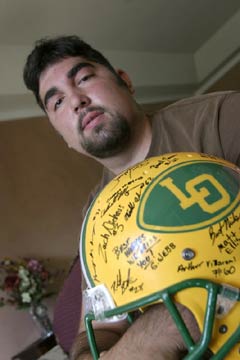Six months after getting a new heart, Justin Martin returned to
sports
Morgan Hill – Three plays into the first game of the 2005 football season, Live Oak senior Justin Martin had to leave the field, gasping for air; just a few days later, his family learned he needed a new heart.
“The doctors told me, this is the kind of condition that exists when you hear about a football player dropping dead on the field and no one knows why,” said Cindy Martin, Justin’s mother, who is trying to raise awareness about the importance of sports physicals and raise money for the Ronald McDonald House where the family stayed during Justin’s ordeal.
Justin, they found out, had a condition called dilated cardiomyopathy, caused by a virus he had at some point in his life, Cindy said. Doctors told her his heart was four times its normal size.
“There was really no sign, no warning,” she said. “During the summer, when he was involved in football practice, he didn’t feel good, he said, and we decided to set up a doctor appointment.”
After an EKG, Cindy said, the doctor told Justin it would be OK to go ahead and play football. As a starting lineman in his senior year, Justin really wanted to play.
The family went ahead with a planned vacation to St. Louis, but Justin was uncomfortable and short of breath in the hot, humid climate. They went back to the doctor when they returned home to Morgan Hill and also made an appointment with a cardiologist.
Before time came for the appointment, however, Justin was forced to pull out of his first game. Later that weekend, he passed up an opportunity to go to an Oakland A’s baseball game with his family, telling them he didn’t think he could climb the stairs.
By Labor Day weekend last year, he was in the hospital, and in the care of pediatric cardiologist Rhonda Lappen.
Lappen didn’t let Justin know how serious his condition was.
“She was really protective of him, she wanted him to get as stable as possible, so his attitude was really important,” Cindy said. “They ran so many tests. And the specialists, they were used to dealing with adults, so she was always in between them and Justin.”
Although Justin didn’t know, Lappen told his mother the very first night she saw him that there would “probably be a transplant in our future,” Cindy said.
Justin wasn’t scared while he went through battery after battery of tests as he waited for a transplant. Later, however, when doctors told him there was a chance he wouldn’t make it, he felt fear.
One week after his name was placed on the transplant waiting list, Cindy said, a heart became available.
“I guess I was pretty surprised,” Justin said. “I thought I could be waiting for months. I was attending school, and I know some of the kids there had been waiting for a long time.”
Justin was discharged 10 days after the transplant.
The Live Oak football team, although few could visit him during his stints in the hospital, was a supportive force behind Justin.
On the night Live Oak Coach Rick Booth told his team a donor heart had been found for Justin, the team won its game 41-7, as if in his honor. Justin joined the team on the sideline for Senior Night, and the team rallied from a 20-point deficit to beat rival Gilroy High.
When he returned to Live Oak in January to complete his senior year, Justin said he didn’t have a lot of people approaching him with questions or concerns or unwelcome curiosity.
In March, six months after getting a new heart, Justin competed in track and field and maintained a 3.8 grade-point average. For his courage and determination, Justin won “most inspirational” awards in football and coaches’ awards in football and track.
“Most people didn’t say anything, because most people didn’t recognize me,” he said. “When I came back, I looked a lot different. I had a full beard, but also my face was a lot fuller because of the medicine.”
Justin was taking prednisone after the transplant, which can cause weight gain and swelling.
There was no special fanfare when he resumed his senior year. And he appreciated that, he said.
He also threw the discus for the Live Oak team. As the school year drew to a close, he participated in all the senior activities. He even garnered several scholarships, including the REACH scholarship from the San Jose Sports Authority.
What he really wants now, Justin said, is to continue with that “normal” life; to attend DeAnza College in the fall, to participate in track and have the life of a college student.
But he is willing, occasionally, to go back to those months before the transplant, to bring attention to his mother’s efforts with the Ronald McDonald House and speak about the importance of organ donation.
Cindy has decided she wants to give something back for the support she and her family received during Justin’s hospital stay. She will participate in the Lake Tahoe Half Marathon on Sept. 30 in support of “Team Ronald McDonald.” Participants raise money to benefit the Ronald McDonald House where Cindy and Justin stayed before his transplant.
The Ronald McDonald House at Stanford is located across from the Stanford mall, convenient to both Stanford University Hospital and the Lucille Packard Children’s Hospital.
“You know, even though I had to be isolated, because they didn’t want me to catch anything from anyone, I knew what being able to stay there meant to those kids, those families,” Justin said. “I could always tell they were having a good time. I know it means a lot to have your family with you.”
Marilyn Dubil covers education and law enforcement for The Times. Reach her at (408) 779-4106 ext. 202 or at
md****@*************es.com.








